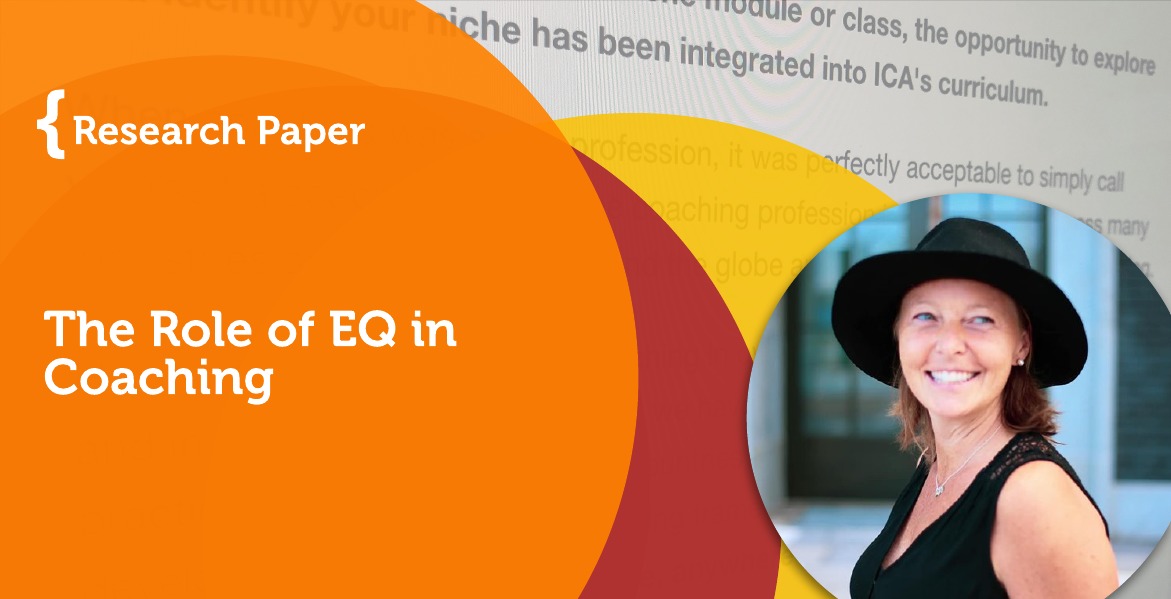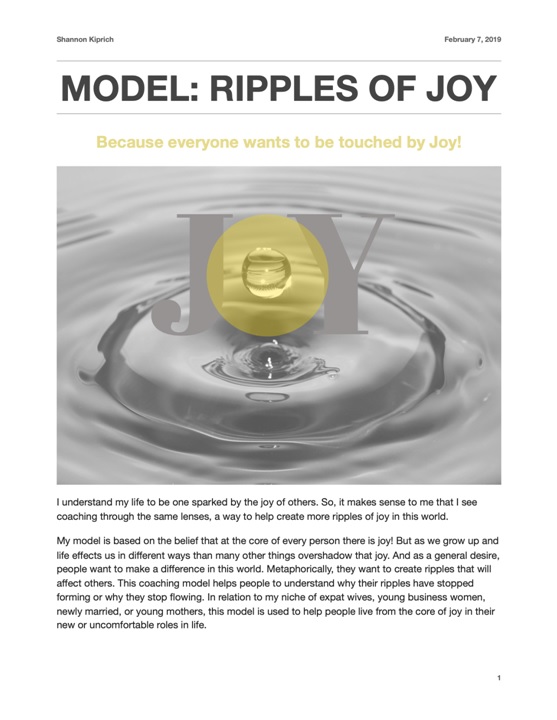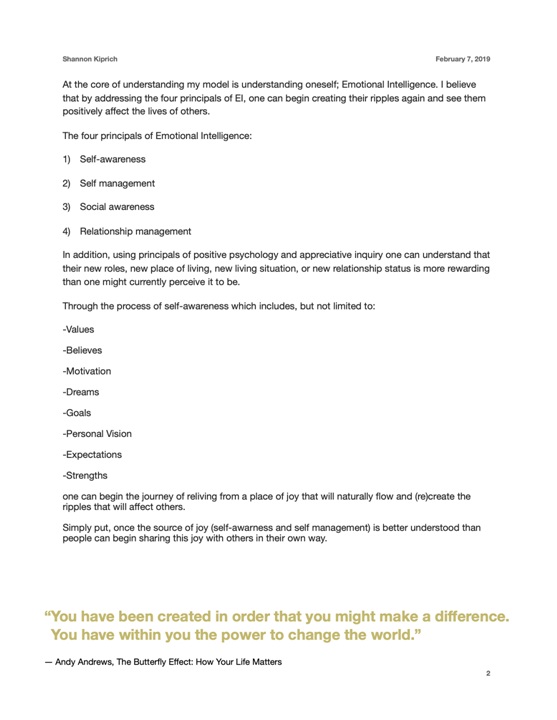 Research Paper By Shannon Kiprich
Research Paper By Shannon Kiprich
(Life Coach, ESTONIA)
Research suggests that knowing one’s own emotional self, or having a high level of emotional intelligence (EQ), can be the source of better leadership skills, greater satisfaction in relationships, personal goal setting with actual achievement, and even ease discomfort in uncomfortable situations. This research attempts to develop the already proven relationship to EI and the profession of coaching; more specifically, to effective coaching that can be offered to adult women expats and clients who are newly married. In addition, this research is written to supplement the coaching model developed for use in coaching situations, Ripples of JOY (Appendix A).
A brief introduction to the topic of Emotional Intelligence or EQ is based upon the work of Howard Garner, who developed the Multiple Intelligence theory, and the continued development of the topic by Daniel Goldman, among others. Based on Goldman’s book we can identify EQ in a variety of ways. For example, we as humans have:
two minds, the emotions and the ration, (which) operate in tight harmony for the most part, intertwining their very different ways of knowing to guide us through the world. Ordinarily there is a balance between emotional and rational minds, with emotion feeding into and informing the operations of the rational mind, and the rational mind refining and sometime vetoing the inputs of the emotions. Still, the emotional and rational minds are semi-independent faculties, each, as we shall see, reflecting the operation of distinct, but interconnected, circuitry in the brain…Emotional learning that life has given us sends signals that streamline the decisions by eliminating some options and highlight others at the outset. The emotions, then, matter for rationality. In the dance of feeling and thought the emotional faculty guide our moment-to-moment decisions, working handing-in-hand with the rational mind, enabling – or disabling- thought itself. The new paradigm urges us to harmonize head and heart. To do that well in our lives means we must first understand more exactly what it means to use emotion intelligently. pg 28
More simply, EQ refers to the ability to perceive, control, and evaluate emotions. When we begin to personalize this topic we can see we are guided by both minds. In a situation we face that we feel fear we can relate to the emotional state of fear or we can relate to a rational state; we can see a snake and emotionally freeze or we can rationally decide the best course of action to take us from this environment or to rationally understand that this snake is not an actual threat, for example.
This research is pertinent to the coaching industry for a number of reasons. I have chosen to base my coaching model around this important understanding of one’s self. Our very own ICA considers EQ a topic that benefits both the coach and the coachee. “For example, a coach who has strong self-regulation skills works with integrity, is flexible, releases judgment and promotes a trustworthy environment.” For both the coach and coachee Goldman suggests that
Emotional Intelligence: abilities such as being able to motivate oneself and persist in the face of frustrations; to control impulse and delay gratification; to regulate one’s moods and keep distress from swamping the ability to think; to empathize and to hope…People with well-developed emotional skills are also more likely to be content and effective in their lives, mastering the habits of mind that foster their own productivity; people who cannot marshal some control over their emotional life fight inner battles that sabotage their ability for focused work and clear thought.
How is it that we can introduce EQ to coaching relationships? Incorporation of the JOY Model can be a simple way to familiarize a coachee about the topic but other ways can bring about enlightenment as well. Goldman has given us a great example that occurs quite frequently in coaching sessions:
Take someone who is annoyed by a rude encounter early in the day, and then is peevish for hours afterward, taking affront where none is intended and snapping at people for no real reason. Hey may well be oblivious to his continuing irritability and will be surprised if someone calls attention to it, though it stews just out of his awareness and dictates his curt replies. But once that reaction is brought into awareness (during a coaching session, for example) – once it registered in the cortex – he can evaluate things anew, decide to shrug off the feelings left earlier in the day, and change his outlook and mood. In this way emotional self-awareness is the building block of the next fundamental of emotional intelligence: being able to shake off a bad mood. (Because) there are two levels of emotion, conscious and unconscious…The moment of an emotion coming into awareness marks its registering as such in the frontal cortex. Emotions that simmer beneath the threshold of awareness can have a powerful impact on how we perceive and react, even though we have not idea they are at work.
Just the other day I purchased a baby rocker with a simple hanging device that plays music and is complete with two small stuffed animal figures. On the box, the company promotes that their rocker promotes 3 of the 7 developmental wonders; Emotional Intelligence, fine motor skills, and senses. While apart of this could be for the marketing of their products, the developmental principals they suggest correspond to the development of all humans and agree with Daniel Goleman and the work being done by CASEL (https://casel.org). The research by these three entities suggests that EQ plays a very important role in the personal development of a person.
Working alongside the JOY model that I have created for my coaching process, personal development is blocked and less successful when a person is unable to continue the flow of sharing life with others. In other words, when a person is unable to connect emotionally when another person their own development is hindered. This is where coaching can play a major role in helping one understand their own emotional intelligence and help foster greater personal development.
For further understanding, I suggest taking all of this information and making it more applicable to specific cases: women who are labeled as Expats and who are newly married (up to 5 years). Let’s begin with what Goldman’s research says about women, in general:
Purely high-IQ women have the expected intellectual confidence, are fluent in expressing their thoughts, value intellectual matters, and have a wide range of intellectual and aesthetic interest. They also tend to be introspective, prone to anxiety, rumination, and guilt, and hesitate to express their anger-openly (though they do so indirectly). Emotionally intelligent women, by contrast, tend to be assertive and express their feelings directly, and to feel positive about themselves; life holds meaning for them…they are gregarious, and express their feelings appropriately (rather than, say, in outbursts they later regret); they adapt well to stress. Their social poise lets them easily reach out to new people; they are comfortable enough with themselves to be playful, spontaneous, and open to sensual experience. Unlike women purely high in IQ, they rarely feel anxious or guilty, or sink into rumination. To the degree a person has both cognitive and emotional intelligence, these pictures merge. Still, of the two, emotional intelligence adds far more of the qualities that make us more fully human.
To briefly highlight how this applies to women who find themselves labeled as an expat: “they adapt well to stress (and) their social poise lets them easily reach out to new people.” And this is a powerful key to unlock potential stress or blockers that are keeping these women from experiencing life in their new surroundings to the fullest.
To highlight how EQ affects the newly married woman who has come to coaching for any myriad of new challenges that present themselves in a deeply committed relationship Goldman has pointed out that:
Empathy builds on self-awarenss; the more open we are to our own emotions, the more skilled we will be in reading feelings. People’s emotions are rarely put into words; far more often they are expressed though other cues. The key to intuiting another’s feelings is in the ability to read nonverbal channels: tone of voice, gestures, facial expression, and the like. A sign that they have a talent for picking up empathy skills – also had better relationships with the opposite sex. Empathy, it should be no surprise to learn, helps with romantic life.
This is a suggestion that helping a woman build more self-awareness (a key attribute of EQ) can help her develop empathy and help with her romantic life. A coach can picture themselves sitting across from such a woman and imagine 1,000 scenarios that most likely begin on the inside of her, rather than being able to blame it entirely on the other partner involved. I actually speak of this experience from my own learning curve that needed to happen after just 4 months of marriage. It was at this point that I began to take seriously this journey of self-awareness and EQ. It was at this point that this topic became of interest to me and thus began my desire to help others in similar situations to develop rather than digress.
In conclusion, using the concept of EQ as a foundational point of coaching has profound and evidence-based results. EQ has been applied to so many other forms of therapy, counseling, intervention, and self-development programs. While Goldman was mainly quoted in this research, there are many more who are contributing to this field of study. I would conclude by stating that the most convincing argument to back up this research and others like it, is the spoken testimony of those who were brave enough to search internally and discover their own subconscious world!
Appendix A: Ripples of JOY Coaching Model


http://www.danielgoleman.info/topics/emotional-intelligence/
https://www.verywellmind.com/what-is-emotional-intelligence-2795423
https://learnsite.icacoach.com/english-campus/frameworks-models-course/emotional-intelligence/